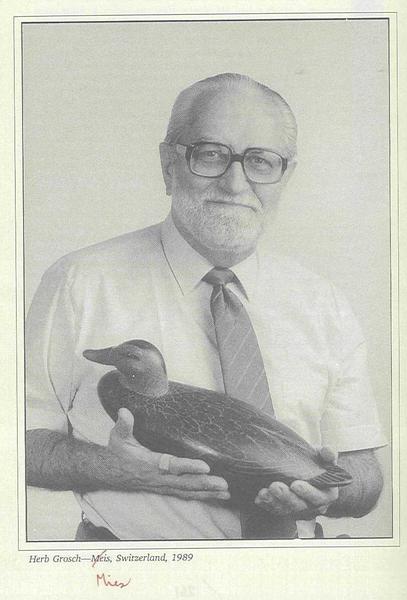"Go away kid you bother me..."
Today, January 25th 2011, marks the first anniversary of Herb Grosch's death.

I was fortunate to have many chances to meet and talk with Herb Grosch over the course of my Graduate work. When I first met him Herb had just arrived at Toronto from Nevada and various other places. One of his first pieces of advice upon meeting me and learning of my interest in the history of computing was to warn me that many professional historians of computing were dismissive of him and other early participants in the computer industry. Borrowing from W.C. Fields, he described the attitude with the phrase: "Go away kid you bother me."
Herb admitted exceptions to his generalization such as I B. Cohen, Paul Ceruzzi and Mary Croarken. Fortunately in my own experience most professional historians are keenly interested in the insight and information that surviving participants in computer history can offer to the field. The need for oral histories from the Australian computer industry was a hot topic of discussion at the World Computing Congress in Brisbane this past fall. Also, computer professionals continue to be major contributors to history of computing alongside professional historians.
Despite all this I believe Herb's attitude was understandable. Computer professionals and professional historians come from different backgrounds, and have different goals. A discipline consists in part of its goals and standards. One way to establish standards is in criticizing the mistakes of past attempts. The reaction of professional historians of science against "Whig history", often associated with earlier accounts of the history of science written by scientists, provides a related case.
I note this potential for conflict to remind us we must all work to move past it. In my own doctoral research I carried out three interviews with Herb Grosch, Harry F. Smith Jr. and Martin Gutzwiller, all of whom were at one time or another colleagues of Wallace J. Eckert about whom I wrote my dissertation. In addition to this material I benefitted immeasurably from the existing oral histories that have been produced by various people and groups over the past 50 years. Some of these interviews are only available from archives such as IBM's oral histories from the 1960s (which can be found in the IBM archives with various copies having made if farther afield) and the transcripts of the interviews carried out as part of research for the 1986 book IBM's Early Computers (a manuscript copy of the interviews exists at the Charles Babbage Institute and in some other places). However many interviews have been made available on-line. Some sources for on-line transcripts include the Charles Babbage Institute, the Computer History Museum, the IEEE and the Smithsonian Lemelson center.
There are many more places where interviews both journalistic and historical can be found and there is always room for more interviews. Hopefully these examples will whet the appetite.


